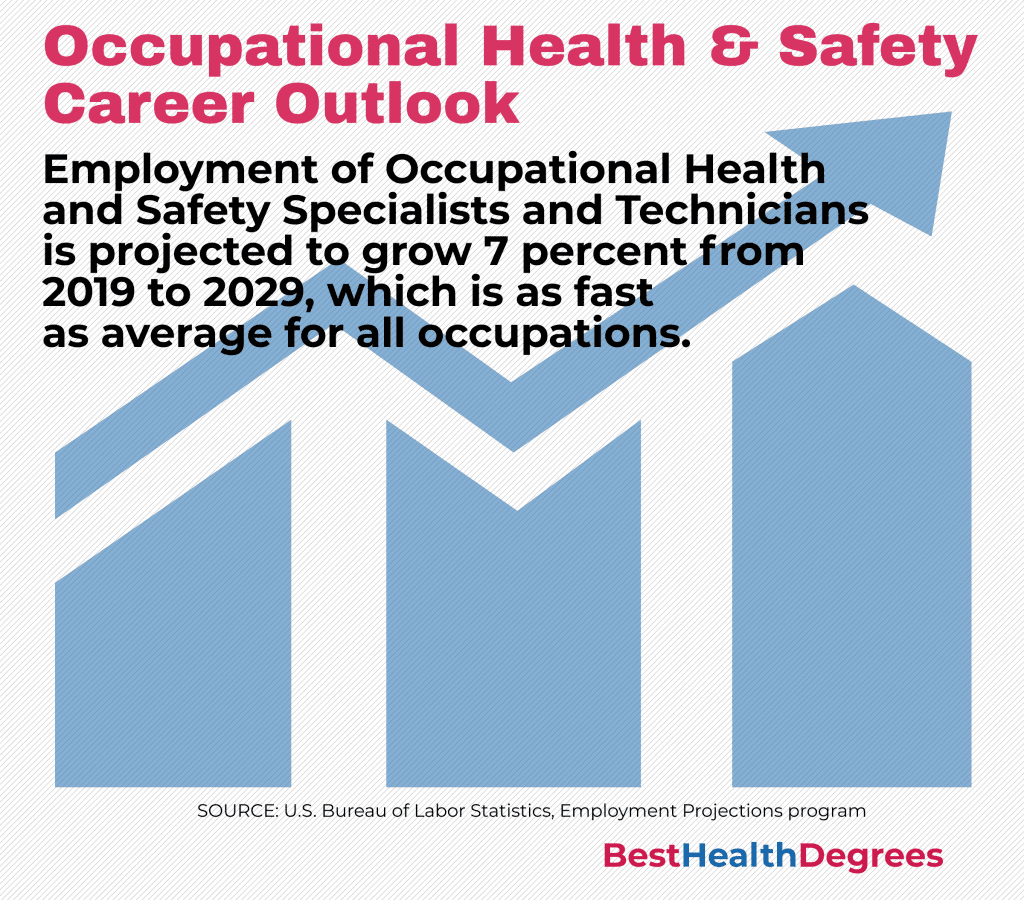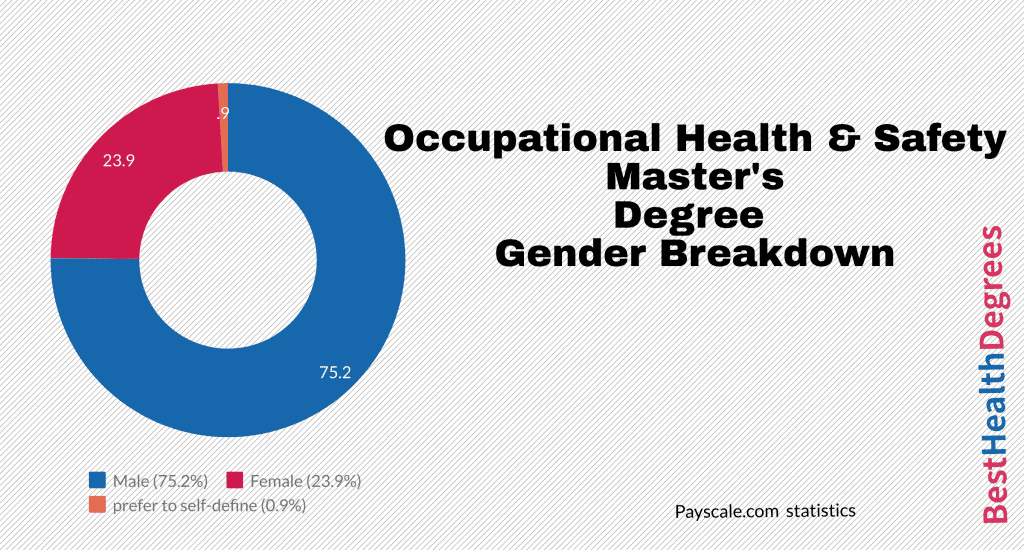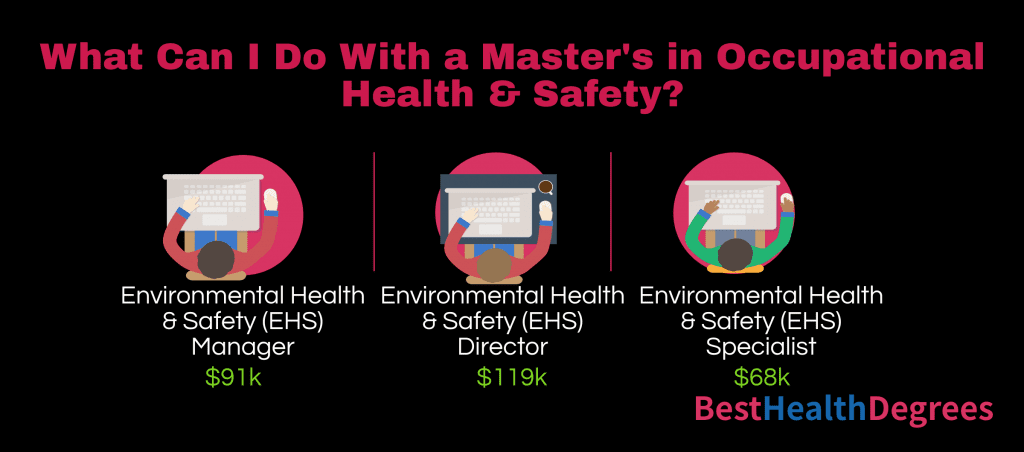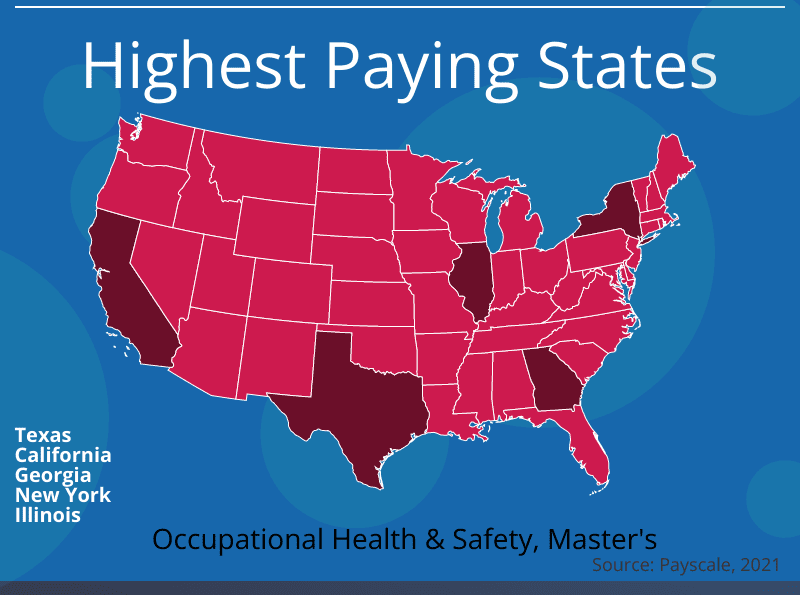Key Takeaways:
- Graduates can pursue roles like safety managers, environmental health specialists, and compliance officers in various industries, including manufacturing, government, and healthcare.
- There’s a growing need for professionals trained in reducing workplace hazards and ensuring compliance with safety regulations. This is driven by both government policy and organizational commitments to worker safety.
- The degree equips graduates with advanced skills in risk assessment, emergency response planning, and safety program management.
Occupational health and safety is a career path many people choose for its rewarding nature and its focus on helping to keep people safe, specifically at the workplace.
People in this field who want to advance into roles that offer more responsibility and salary will often consider if they should take the route of a graduate degree to do so.
In just about all cases, a master’s in occupational health and safety is worth it. It helps to look at what makes a master’s degree worth it in general. From there, it’s easy to see how it can all apply to an occupation health and safety career.

Is a Master’s in Occupational Health and Safety Worth It?
The focus of the OHS field is to ensure the safety of a workplace, help to prevent hazards, illness, and anything else that can negatively affect the people who work in a specific place, industry, or area. The major industries served most by OHS professionals include manufacturing, construction, and government.
The job outlook for OHS specialists, technicians, and others in the field will grow. This means there will be a lot of competition. One way to stand out from and above others in or entering the field is to have a master’s degree.
A master’s degree represents an investment in someone’s career. Those who pursue a master’s degree aren’t typically looking at the pursuit as a cost to bear, but as something that will lead to more opportunities. Those people are correct.
Some positions within the occupational health and safety field may well require a master’s degree. However, OHS also thrives off experience. Someone already working in the field can leverage their experience to find work, change careers, seek promotions, or do something else. However, a master’s degree helps to ease all possible transitions.
In addition, the degree helps someone to show their knowledge of the field and a specialization in it. This becomes more important as an OHS career advances and the focus becomes narrower. In most ways, a master’s degree in occupational health and safety will always benefit the graduate who receives it.
The one caveat to that is that the graduate must have a plan and goal for making use of their master’s degree education. It’s true that people with a master’s degree in just about any field can earn a higher salary and pursue more career opportunities. However, the degree alone won’t make things happen if the graduate isn’t applying themselves to utilizing the degree to its fullest.
The good thing is, there are a lot of options when it comes to earning a master’s in occupational health and safety. Many online OHS master’s degree programs are out there, and they can help people who are otherwise busy working and taking care of adult responsibilities, to earn their graduate degree. For all these and many more reasons, applicants should start to see just why a master’s degree in occupational health and safety is worth it.
How Do I Choose the Right School or Program for a Master’s in Occupational Health and Safety?
Choosing the right school or program for an OHS master’s degree doesn’t have to become too large of a concern. Generally, the criteria that matter most will include the school or program’s reputation, accreditation, and the goals of the applicant.
Even when looking for the best colleges for occupational safety and health, it’s easy to forget that what’s best for one person isn’t necessarily the best for someone else. That’s why the goals of the applicant matter just as much as the status of the school, university, or degree program. Those few considerations alone can help narrow down the choices for the applicant while leaving them with enough options that they can start to include other criteria.
How Important is Accreditation in an OHS Master’s Degree Program?
Starting with accreditation can help save someone a lot of time on choosing schools. In every possible instance, the applicant should look for a school or program with reputable accreditation. Accreditation means a school, university, or program follows educational and quality guidelines set by groups, professionals, or government agencies.
The school or program will adhere to those guidelines and provide the type of high-quality education expected of the accrediting bodies that set the guidelines. This is important as it means the education, the faculty, and even some of the teaching methods will adhere to a high standard. Without accreditation, there’s no guarantee of quality.
Understand there are various types of accreditations, and various accrediting bodies. Two major types of accreditation to look out for include regional accreditation and programmatic accreditation.
What Is Regional or Institutional Accreditation?
Regional accreditation comes from accrediting bodies approved by the Department of Education. The six major accrediting bodies cover different regions of the country, hence the name. Regional accreditation is a bare minimum in most cases. Although, it’s not always necessary. Regional accreditation tends to cover a school or university, and not necessarily individual academic programs.
What is Programmatic or Specialized Accreditation?
Programmatic accreditation, sometimes called specialized or national, tends to come from professionals and rule-makers within a particular field. This is an important form of accreditation because it means the program will teach what those who are in the field at the highest levels think is important.
That isn’t to say a student won’t gain an academic education, but they’ll gain one that has relevance to the field or industry that’s immediately applicable.
One of the well known and most accepted accrediting bodies for occupational health and safety is the Accreditation Board of Engineering and Technology (ABET). A master’s degree accredited by ABET will give the graduate a degree accepted everywhere in the country.
The specialty someone works or wants to work in can also dictate what type of accreditation they should look for. In most cases, an applicant can simply visit the program’s site page, see who accredits the program, then go look at that accrediting body’s standards.
A degree program can have programmatic accreditation without regional accreditation. If the accrediting body is a highly prestigious one or an industry-standard group, then that’s usually all that matters. Behind that highly accepted accreditation, an applicant may find some of the best colleges for occupational safety and health master’s programs.
Other types of accreditation can put an applicant at ease but they should consider the appropriate programmatic accreditation status as a necessity for their master’s degree. Still, the best colleges for occupational safety and health will certainly have one or more types of accreditations associated with them.
As with most things, accreditation isn’t always the most important thing. Some unaccredited master’s degrees will still work just as well. Some degrees may need accreditation from a local or state-approved group before a graduate can work in certain industries or capacities in those areas.
Nevertheless, simply starting with looking at accreditations is an important first step for those who see the many offline and online master’s in occupational health and safety programs out there. Narrowing the choices down by the quality that some accreditation bodies guarantee can go a long way toward easing what can sometimes be a hard choice.

What Are Some of the Different Types of Occupational Health and Safety Degrees?
An occupational safety and health masters degree online or offline can come in a few different forms. To start, there are different naming schemes for this field. For example, it’s interchangeably called:
- occupational health and safety
- occupational safety and health
- OHS
- OSH
- safety management
- occupational health
- occupational safety
Degree programs from different schools may also use these or other slightly different names for their master’s degree programs. Applicants seeking an occupational health and safety masters degree online may also run into different naming conventions for the degrees.
In this case, no one should worry. These different names all point toward the same exact degree. If in doubt, an applicant can simply look at the curriculum to see if it’s the type of degree they think it is.
An offline or online masters degree in occupational health and safety can also have a name that’s more in line with the specialty a student might study. Some programs tend to name their degrees by concentration rather than overall field or subject. Some examples include:
- Master in Safety Engineering and Management
- Master’s in Occupational Risk Prevention
- Masters in Emergency Preparedness and Response
Once again, applicants who aren’t sure can easily ascertain the type of degree the program offers with a little due diligence. An occupational safety and health masters degree online can exist strictly for someone working in a specific industry or niche, and the name of the degree might reflect that.
Applicants need to make sure the degree type fits with their goals, has proper accreditation, and includes the type of curriculum that will help them in their career. Other than that, the specific title of the degree will only matter if they’re pursuing a specialty where having that specialty’s name as part of the degree will serve them better than simply saying occupational safety and health.
This all also points back to the fact that an occupational health and safety masters degree online works best for those who want to pursue a deep level of additional education within an OHS specialty. Some online masters degree in occupational health and safety programs exist specifically for certain specialties. So, applicants should show care and not choose a program online or off that might clash with their goals.
Are Licenses or Certifications Necessary in the Occupational Health and Safety Field?
Whether someone might need a license or certification will vary widely as it depends on the nature of their job, the field they’re working in, the requirements of their employer, and other factors. Generally, licensing or certification isn’t a necessity for a large part of the OHS field.
However, there are many reasons why someone should seek occupational health and safety certifications, even if they don’t immediately need them. Some OHS degree programs also offer certification with graduation or make earning a particular type of certificate as part of the overall curriculum.
Because of the nature of the OHS field, there are a ton of occupational safety and health certifications out there. And some professionals would do well to try to find and procure some of the highest paying safety certifications in their specialty.
Also, some occupational safety and health certificate programs can allow someone to add a specialty to their credentials without having to go through a full degree course to obtain a particular skill. For these reasons, it’s always a good idea to pursue occupational health and safety certificate programs that align with the graduate’s goals.
Types of safety certifications include those offered by OSHA, which include:
- Advanced Safety and Health
- Occupational Safety and Health Manger
- Healthcare Safety Technician
- Refinery Safety Technician
These are just a few offered by OSHA, but they show that certifications can be both general and specialized. Typically, a certification shows someone has aptitude in a particular aspect of occupational health and safety, and has the credentials to show it. These occupational health and safety certifications can put someone in an ideal position to pursue opportunities within certain avenues of the OHS field. Just like with a master’s degree, occupational safety and health certifications help individuals stand out from the crowd.
Some employers may require an applicant to have a particular certificate, or they may have an employee earn a certificate while working. Many OHS-focused businesses also offer occupational health and safety certifications, which can help someone work for that business, or show a different employer they are willing to learn more about something because they’re serious about what they do.
Many places offer various types of safety certifications. Applicants should make sure they look for the highest paying safety certifications and the OHS certificate programs that will serve them best where they live and where they work or plan to work.
In the case of licensing, professionals will likely know if they need a license for a particular job or niche. Licensing isn’t always necessary, but for some industries, especially those with heavy regulations, an OHS professional may need a license to work or do anything that requires more responsibility than normal.

What Are Some of the Careers in Occupational Health and Safety?
Generally, if there’s a workforce or a workplace somewhere, then there’s a career in occupational health and safety there as well. The occupational safety and health job description can fit in any industry or business. That same occupational health and safety job description can also vary from the next one in pay, job title, and industry, despite the next employer expecting the same types of duties from the OHS professional.
Since job title does play a role, applicants should pay close attention to what an occupational job description says. For example, the occupational health and safety specialists job description may match the occupational health and safety technician job description word for word. Yet, the difference in salary can vary between specialists and technicians.
What does an occupational health and safety specialist do? What does an occupational health and safety officer do? These types of questions can lead to very different answers from different employers. Sometimes the titles become interchangeable and sometimes they’re very different. Even asking what does occupational health and safety mean can elicit differing answers.
Not that an applicant should feel confused when they’re looking at something like an occupational safety officer job description while comparing it to the occupational safety job description an entry down. Applicants should just make sure they look at what the job entails and whether it’s one of the masters in occupational health and safety jobs, and not a well worded entry-level position.
All that said, some of the masters in occupational health and safety jobs and careers can include:
- Safety consultant
- Safety manager
- Safety technician
- Safety trainer
- Industrial hygienist
- Air quality specialist
- Environmental consultant
- Health policy analyst
The list really does go on and on. Applicants need not limit themselves to jobs and careers that only contain the words occupational health in safety in their titles. Look at an occupational health and safety advisor job description, see if it’s the same as an occupational health and safety coordinator job description. Then, the applicant can look at something like corporate safety advisor, which may just consist of the same duties but pay a much higher salary.
One specific type of career path many in the OHA field want to pursue are OSHA career opportunities. What is the main purpose of the Occupational Safety and Health Administration? Anyone is free to read their mission statement.
As the public sector of the field, OSHA inspection jobs and other positions lead many to immediately ask how to get a career with OSHA or how to get a job at OSHA. Where are the OSHA career opportunities? As a government position, OSHA inspector jobs aren’t as readily available as similar jobs in the private sector.
As OSHA is a federal agency, interested applicants must apply as they would with any federal job. This is possible through the USAJOBS website and narrowing the search options to just those from the Occupational Safety and Health Administration.
What Kind of Salary Can Someone Earn with an Occupational Health and Safety Degree?
A large degree of variation exists when it comes to occupational safety and health degree salary. While a masters in occupational health and safety salary will typically help someone earn more on average, the applicant may still have to do some legwork to find the right opportunities.
Occupational safety degree salary can vary based on such factors as location, employer, experience, industry, niche, contract stipulations, demand, and many other things. As job title can play a large role in occupational health and safety degree salary, it’s important that job applicants or those looking to advance pay close attention to what job they’re applying for.
Still, the Bureau of Labor Statistics lists the median amount of $72.53k for occupational safety and health degree salary. This amount applies collectively to those working as occupational health and safety specialists or technicians. However, a masters in occupational health and safety salary will typically sit on the right side of the median range.
The degree can also help someone move into higher level positions. For example, the median pay for a health and safety engineer sits at $94.2k. Glassdoor shows a $77k average for this field, and some employers pay above $100k in certain industries.

Are There Any Professional Organizations for Occupational Health and Safety Professionals?
The very nature of the occupational health and safety field lends itself to an incredible number of professional organizations. A professional organization can help anyone in the OHS field, at any experience level, in several ways. Some of the benefits of a professional association include:
- Access to exclusive resources
- Professional development opportunities
- Access to unadvertised career opportunities
- Seminars, meetings, discussions, conferences, and continuing education
- Discounts on materials and other things related to the industry
Maybe the largest benefit comes from the networking opportunities. OHS professionals can join organizations that include prestigious members in their field. This can include trendsetters, policymakers, corporate officers, and others. Meeting others in the field can foster the exchange of ideas and information, which can lead to great things.
Some of the OHS professional organizations include:
- IOSH – Institution of Occupational Safety and Health
- NSC – National Safety Council
- ASSP – American Society of Safety Professionals
- WSO – World Safety Organization
- AIHA – American Industrial Hygiene Association
Many, many others exist as well. In addition, applicants will find there are singular professional organizations as well as some within some of the larger groups that account for specialties and niches. Professional organizations also exist at every conceivable level. Even while earning their degree, a student may learn that the college or university itself has a professional occupational health and safety organization, or a related professional organization.
Towns and counties may have such organizations as well. This also applies at the state, federal, and even international level. Considering the benefits, it’s a good idea for an OHA professional to join which organization may help them achieve their goals, advance their careers, and help them do more with their degree in the field.
While some of the larger organizations have a lot of value, some OHS professionals may find far more benefit joining the organizations that consist of others from their county or state. No matter the case, these organizations exist to help, and OHS professionals should certainly join which ones they comfortably can.
Related Rankings:
25 Best Master’s in Occupational Health and Safety Programs
15 Best Master’s Online in Occupational Health and Safety Programs
10 Fastest Online Master’s in Occupational Health and Safety